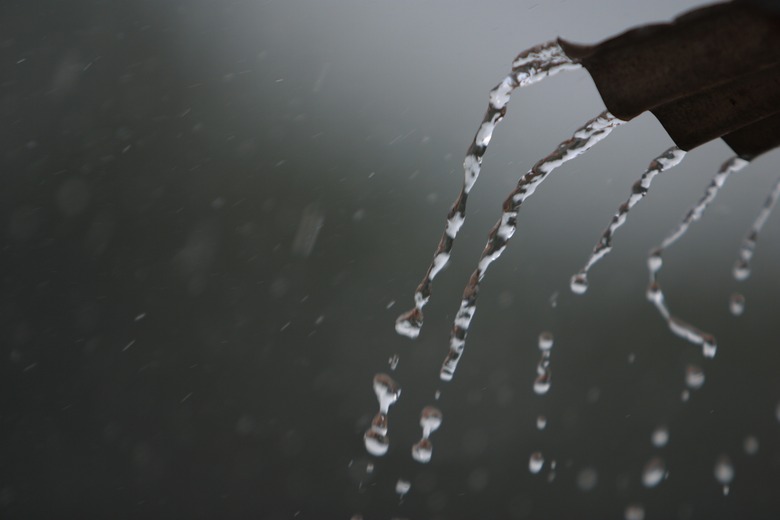How To Conserve Rain Water For Household Use
Our planet's freshwater resources are limited. With increasing populations worldwide, there is increasing pressure on these resources. Collecting rainwater for later use, or diverting it so that it does not become wastewater, is a very effective and easy way to conserve water. A typical household can reduce their consumption of treated water from mains by between 30 and 50% by harvesting rainwater (according to the "Save the Rain Campaign").
Rainwater Harvesting
Step 1
Rainwater harvesting involves collecting and using the rainwater run-off from your household roof. Typically this water would be collected in the roof gutter and run into the storm water system via a downspout. This is an incredibly wasteful practice as the rainwater is often contaminated along the way. Several strategies for harvesting rainwater are available, ranging from simple to extensive.
Step 2
Diverting the downspout from your roof into your garden is the simplest way of harvesting rainwater. The downspout normally directs water to an easy run-off pathway such as a driveway from which it runs into the storm water system. Diverting the spout onto your lawn or garden prevents this water from running away unused.
Step 3
Instead of simply diverting the rainwater, it is possible to collect it in a barrel or cistern for later use. Rain barrels are simple containers, typically installed above ground and for outdoor use. They vary in size depending on your requirements and can be equipped with a tap and hose for easy use. Cisterns are larger rainwater tanks, often installed below ground, intended for storing water for general household use. They are equipped with a pump and can supply water both in- and outdoors.
Uses for Rainwater
Step 1
Rainwater is ideal for toilet flushing, clothes washing, bathing or showering and garden irrigation. Replacing water from water mains with rainwater in these activities offers the biggest contribution to water savings as they use a large volume of water year round.
Step 2
Other uses include vehicle, yard and household cleaning.
Step 3
Filtered, untreated rainwater should only be used for non-drinking purposes. Rainwater is generally less reliably safe for drinking than water from water mains which is treated to be fit for human consumption. Drinking and food preparation contribute only a small amount to the average household water consumption and therefore offer little in the way of water saving opportunities anyway.
Managing the Quality of your Harvested Rainwater
Step 1
Use a simple filter to prevent leaf litter and other debris from entering the tank.
Step 2
Keep your roof clean to minimize contamination from bird droppings and dust. Rain can do this job for you. Simply divert the first of the rain off your roof and away from your tank.
Step 3
Keep your tank closed and well sealed to prevent animals and insects from entering it.
Step 4
Maintain and inspect your gutters bi-annually and check your tank for sludge accumulation once every 2 or 3 years. Clean if necessary.
Things Needed
- Rain water barrel or cistern
- Additional plumbing
- Pump
TL;DR (Too Long; Didn't Read)
When diverting rain water directly to your garden make sure to check that the end location is large enough, drains well and can handle the amount of water that it might receive during a storm without flooding.
Cite This Article
MLA
Ph.D., Michael Owen,. "How To Conserve Rain Water For Household Use" sciencing.com, https://www.sciencing.com/conserve-rain-water-household-use-2567/. 24 April 2017.
APA
Ph.D., Michael Owen,. (2017, April 24). How To Conserve Rain Water For Household Use. sciencing.com. Retrieved from https://www.sciencing.com/conserve-rain-water-household-use-2567/
Chicago
Ph.D., Michael Owen,. How To Conserve Rain Water For Household Use last modified March 24, 2022. https://www.sciencing.com/conserve-rain-water-household-use-2567/
